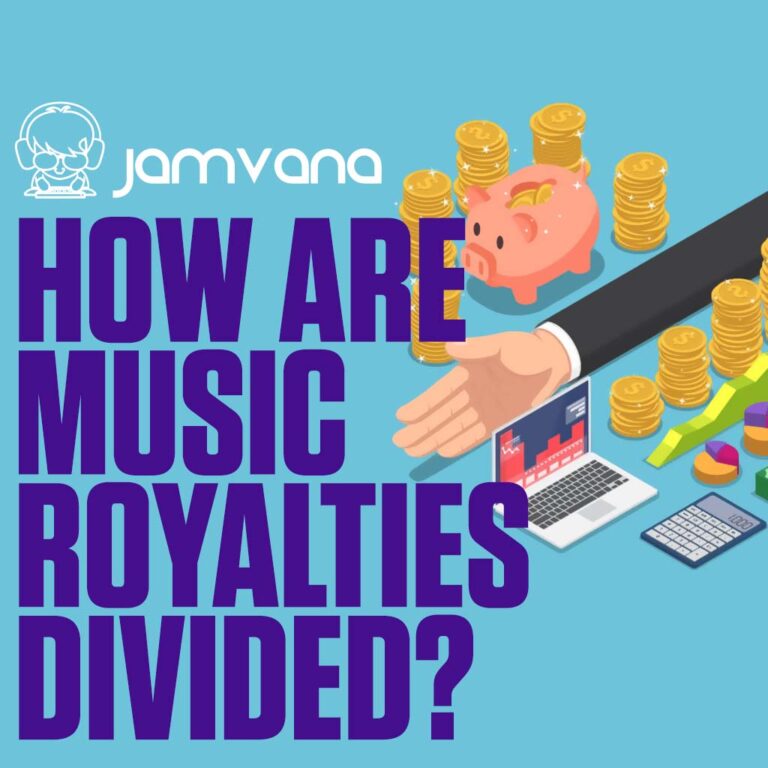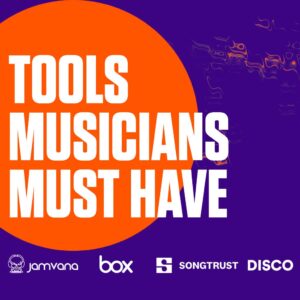What are music royalties? How are they divided between copyright holders? What organizations do you need to sign up to to collect your share of the royalties?
The music industry doesn’t make royalties an easy topic. They’re all over the place, and every country has different organizations and rules. Thankfully, you don’t need to know how every country’s royalty collection societies and copyright laws function in order to collect royalties where your music is publicly played, performed, or aired.
However, you should at least understand how royalty payments are divided amongst songwriters, publishers, and artists. We’re going to cover these things in-depth throughout this blog post.
The Basics of the Music Industry Payment Structures and Music Royalties
Music royalties are the money generated by a song or album’s usage. This usage can be a public performance, stream on Spotify, Apple Music, or other digital service provider, or a sync license (which we’ll cover in detail a little later on). Royalties are paid to the copyright holders. There can be one or many. For example, an up-and-coming band may be signed to a contract with a record label that pays them 10% of all revenue created from the sales of their music on physical CDs and streaming services. The individual musicians may then also receive royalties based on their contribution to the song as well as any profits made from publishing royalties.
An independent artist or band, on the other hand, would receive all of those royalties without having the label getting a cut.
Music royalties have evolved a lot over the years, and there are more streams of revenue than ever before in the history of music. And companies like Jamvana, SoundExchange, and Songtrust are helping songwriters, artists, and musicians collect the money and royalties they deserve.
If you’re a songwriter, artist, or musician yourself, these companies provide services such as collection and distribution of mechanical royalties for songs and compositions, collection and distribution of performance royalties for artists and musicians, payment processing services to help manage royalty payments in the digital age, and an administration throughout the process of collecting mechanical royalties with an easy-to-use reporting system so that the publisher, performer and performing rights society can easily see how mechanical royalties are collected and paid.
The Various Types of Royalties Paid to Artists, Songwriters, and Music Publishers
Royalty types vary in terms of the source, what is being paid, and how it is calculated. The following are some common examples of the royalties paid to artists, songwriters, and music publishers:
- Mechanical royalties: These royalties are collected by a mechanical rights administrator on behalf of the songwriter or composer. In the United States, it’s the Mechanical Licensing Collective (MLC) or Songtrust.
- Performance royalties: These royalties are paid to songwriters for “public performances” of their songs. The royalties are collected by performing rights organizations such as ASCAP, BMI, and SESAC.
- Digital performance royalties: Also referred to as “neighboring rights,” these are royalties paid to the sound recording copyright owner such as the artist and/or label for a public performance of the sound recording. These royalties are generated when a sound recording is played via a non-interactive stream (Pandora, SiriusXM). This does not apply to terrestrial radio in the US, unfortunately. This is, however, hopefully on the verge of changing with the introduction of the American Music Fairness Act.
- Sync licensing fees (technically not a royalty): These are upfront fees that are paid to the sound recording and composition copyright holders in exchange for a license to use their music.
We covered the various types of music royalties and how they’re collected in a previous blog post.
How are royalty payments tracked?
Well, this is somewhat of a loaded question because, as you probably know by now, there are multiple streams of royalties. Different companies and collection societies collect different types of royalties, which doesn’t make things easier (and I wish there was one system that collects all of the royalties). That would seemingly make it easier for songwriters, publishers, artists, and labels to collect their royalties.
However, to be brief, royalty payments are usually tracked based on the song’s metadata, which includes the works’ copyright, collaborators, songwriters, publisher, mixing and mastering engineers, studio information, and more. Primarily, though, when referring to “royalties” it’s typically common knowledge that it’s referring to the ones the distributor or label and publisher collect.
The record label and publisher will then pay the artists and songwriters, respectively, that it represents. One way of looking at how royalties are split is that each party who has been involved in the creation of a musical work, such as a recording artist, producer, arranger, or songwriter (collectively referred to as “Music Creators”) may be entitled to a percentage of the royalties, depending on their contribution to the project. A producer may receive credit on the album, but that doesn’t mean they’re entitled to royalties (unless it was previously negotiated).
However, if the producer assisted in writing the lyrics and melodies, then they would also be credited as a songwriter; therefore, entitling them to mechanical and publishing royalties.
Another example would be if there are two songwriters, each of those songwriters could negotiate a 50/50 split for mechanical royalties and publishing. Their publishers—they may be the same or different—will collect and pay out those royalties for them.
Since everything is negotiable, the royalty splits and agreements need to be in writing. These contracts should be written by an attorney so everything is done correctly and fairly. The goal is to avoid disagreements and lawsuits in the future.
How to Track Down Your Music Royalties
Music royalties are royalties that artists receive for the use of their songs by other artists. They can be collected by an artist’s record company or music publisher, or through these companies’ agreements with songwriters and publishers. Royalties from digital downloads are different from selling physical copies of CDs, which is why some artists refer to digital downloads as “streaming.” In order to find out how much a particular song is worth in terms of royalties, an artist should know who created it and who owns the rights to it. The songwriter and/or owner of copyright is the primary individual who would be responsible for payment of royalties.
If you want to collect all of the royalties you’re owed, be sure that you’re signed up to the following services:
- Music distributor (like Jamvana)
- SoundExchange
- Songtrust (or any other admin publisher)
- ASCAP, BMI, SESAC, SOCAN (or any other performing rights organization)
Those are a few of the most important organizations and companies to get started, but there are more. Sign up to our email list via the sign up box below and we’ll send you the full list.
Conclusion
As you’ve probably learned, music royalties can be divided in any way, shape, or form, as long as they’re negotiated and in writing. In a way, that makes things easy because you have the freedom to negotiate pricing.
Music royalties are an incredibly complex topic and get confusing more often than not, but we’re doing our best to water them down so you can best understand them and easily get paid the ones you’re owed.
Do you have any questions? Leave a comment and we’ll answer them.






